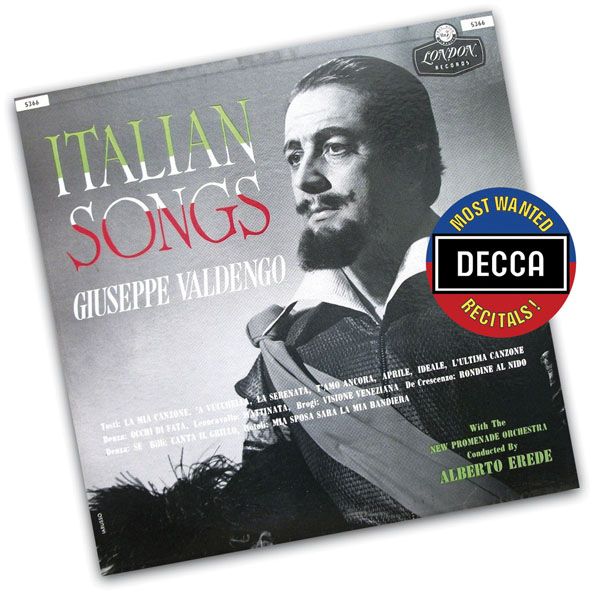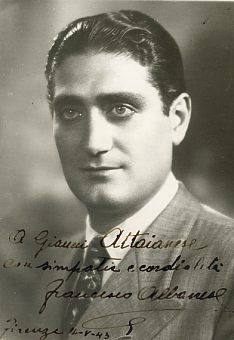|
SATURDEE OPRY LINKS 40:
Mostly Neapolitan Songs!
 
Giuseppe Valdengo
Franceso Albanese
Saturdee Opry Links Overture!
"La Belle Helene," by Offenbach.(You think you
don't know it, but you're wrong.)
https://www.youtube.com/watch?v=f4wu4qfhGw8
http://www.bbc.co.uk/music/reviews/5n8c/
1.
In Offenbach's beloved comic opera, "La Belle Helene," there is a terrific,
heroic sounding tenor aria, "Au Mont Ida Trois Desses" ("On Mt. Ida there were
three goddesses.") You'd think, to listen, that this was about perserving
through hardship, resolving to push on with head held high, but. . .no. It's
just a whimsical, lyrical story of three goddesses and "their funny ways." And
so it is with opera. It has its funny ways. Still, here is the most thrilling
rendition of this aria ever recorded, by Jussi Bjorling.
https://www.youtube.com/watch?v=n35QhvRJgMw
Translation (you'll have to copy and paste entire link.)
https://translate.google.com/translate?hl=en&sl=fr&u=http://www.impresario.ch/karaoke/show_karaoke.php%3Fid%3D355&prev=search
About the opera:
https://en.wikipedia.org/wiki/La_belle_H%C3%A9l%C3%A8ne
2.
Keeping it light today, here is the beloved Neapolitan song, "Mattinata," by
Leoncavallo. Usually this is sung by tenor, but here is a rather glorious
rendition by Joan Sutherland. "The dawn, dressed in white, has opened the door
to the sun. . ."
https://www.youtube.com/watch?v=RpQV4YKPZ5M
Translation:
http://www.lieder.net/lieder/get_text.html?TextId=10075
About the great Sutherland:
https://www.nytimes.com/2010/10/12/arts/music/12sutherland.html
3.
Canzone napoletana, or Neapolitan song, is a generic term for a traditional form
of music sung in the Neapolitan dialect, ordinarily for the male voice singing
solo, although well represented by female soloists as well, and expressed in
familiar genres such as the lover's complaint or the serenade.(Wiki.) Here is a
rare recording of the wonderful and largely forgotten soprano, Lina Cavalieri,
with the lesser known Neapolitan song, "Maria, Mari."
https://www.youtube.com/watch?v=-ym54cXLghk
Translation:
http://musicasitalianas.com/vedere/vedere_musica.php?ver=us&vedere=mariamari4
Everybody has a story. Cavalieria lost her parents at fifteen and became a ward
of the state, later sent to live in a Roman Catholic orphanage. The vivacious
young girl was unhappy under the strict discipline of the nuns, and at the first
opportunity she ran away with a touring theatrical group. More on her
astonishing life:
https://en.wikipedia.org/wiki/Lina_Cavalieri
4.
"Please tell your friend / that I've lost sleep and fantasy too /
that I always think of her / that she's all my life / I'd really like to tell
her / but I don't know how to tell her. . ."
Sometimes a Neapolitan song---often, really---is impassioned and dramatic enough
to match great operatic arias. Perhaps this is one such case. You be the judge!
Here is the great baritone, Tito Gobbi, with the gorgeous, thrilling "Dicentello Vuje."
https://www.youtube.com/watch?v=6Wf6r1ocwdA
Translation:
http://www.italyheritage.com/italian-songs/regional/campania/dicitencello-vuje.htm
5.
"When the moon shines in Marechiaro, even the fishes fall in love." This gives
you the general tenor of "Marechiare," the great Paolo Tosti
Neapolitan song.
And here is the specific baritone, again, of Tito Gobbi, simply because this is
such a beautiful color clip of the man in action. Funny that his speaking voice
is so much higher than his singing voice.
https://www.youtube.com/watch?v=5uyfHtBRyJQ
Translation:
http://www.napule-de-canzone.com/marechiare_eng.html
6.
Well! Everybody's a snob! Seems one must be innately familiar with Naples and
its culture to sing a Neapolitan song to greatest effect. So insist various
writers, critics, aficianados, and I guess I have no reason to doubt it. Yet one
high-handed opera "expert" blogger asserts that The Three Tenors versions of
Neapolitan songs are to be avoided. Har! Balderdash! Not at Saturdee Opry Links, where we
are all proud rubes! Still, the blogger recommends, among others, the largely
forgotten tenor Francesco Albanese for this genre, and I always bow to greater
expertise. Here is Albanese---whose singing is surprisingly straightforward and
restrained---with "Chella d' 'e rrose."
https://www.youtube.com/watch?v=-dE972IqTxA
And here is the blogger in question:
http://greatoperasingers.blogspot.com/2012/11/francesco-albanese-power-of-dignified.html
Translation:
http://www.napule-de-canzone.com/chella_de_rrose_eng.html
About Albanese:
https://en.wikipedia.org/wiki/Francesco_Albanese
7.
Born in Naples, and schooled at the Naples Conservatory, Franceso De Lucia, a
great verismo tenor or the turn of the last century, is considered one of the
finer Neapolitan song interpreters. But you have to like vibrato, I warn. Here
he is with the lovely waltz, "Serenata a Surriento," not to be confused with "Torna
a Surriento." Great moustache!
https://www.youtube.com/watch?v=6cXrHGYH8sM
Translation:
http://www.napule-de-canzone.com/serenata_a_surriento_eng.html
8.
Giuseppi de Stefano smoked, drank, "enjoyed the company of women," and as a
result blew his voice out early. Still, he remained the favorite singing partner
of Maria Callas, which is no small achievement. Here he was still in
sufficiently good voice to assay this lovely old Neapolitan chestnut, "Luna
Nova."
https://www.youtube.com/watch?v=eqUDrIlDKAA
Translation:
http://www.napule-de-canzone.com/luna_nova_eng.html
About de Stefano (who was brutally murdered, late in life, on his estate in
Kenya---apparently race-motivated):
https://www.nytimes.com/2008/03/04/nyregion/04distefano.html
9.
Giuseppi Valdengo was not considered to have a "beautiful" baritone, rather a
potent, scrupulously musical one. Hell, I think it's beautiful, so what do I
know? This is a selection from his recently issued "Italian Songs" album, which
I recommend.
"Aprile," by Paolo Tosti.
https://youtu.be/WukyAuVqs0s
Translation:
http://www.lieder.net/lieder/get_text.html?TextId=12385
"Aprile," by Paolo Tosti.
https://www.youtube.com/watch?v=WukyAuVqs0s&list=OLAK5uy_nlCwI23L0Ohxsg2fMO6zHMOCsn_cb_T80&index=3
Translation:
http://www.lieder.net/lieder/get_text.html?TextId=12385
FINAL BOW, Neapolitan Song special edition of Saturdee Opry Links.
Mario Lanza did more for opera than can be measured, although he only sang one
complete opera on stage. Legendarily seduced by Hollywood and fame, his
appearances in films did much to inspire love of opera, the world over. If the
only result of Lanza's films was to have inspired Pavarotti, Domingo, and
Carreras (true), that would have been enough. Here he is in his penultimate
film, "The Seven Hills of Rome," in 1958, a year before his death at 38. The
"greatest tenor of the century," as proclaimed by Toscanini, the soprano Licia
Albanese, and many others, had lost some of the bright sheen of his voice, but
not the allure or power. Here he sings the god-emperor of Neapolitan songs, "O
Sole Mio." Although it is quite the cliche, a read of the lyrics reveals why it
is so beloved, and endures.
https://www.youtube.com/watch?v=1X27O50Xq4U
Translation (Neapolitan dialect and English):
https://en.wikipedia.org/wiki/%E2%80%99O_sole_mio
Here he sings "O Sole Mio" in 1949, ten years earlier.
https://www.youtube.com/watch?v=OkvFgzzyh5w
Saturdee Opry Links Encore!
One guy singing to a lady, pleading that she stay with him in Sorrento might not
be enough. But three? Maybe that would do the trick. Here are Jose, Luciano,
Placido.
https://www.youtube.com/watch?v=eTaIWrfX6uw
Translation:
https://en.wikipedia.org/wiki/Torna_a_Surriento
Back to Opera Links
Back to Home Page
|



